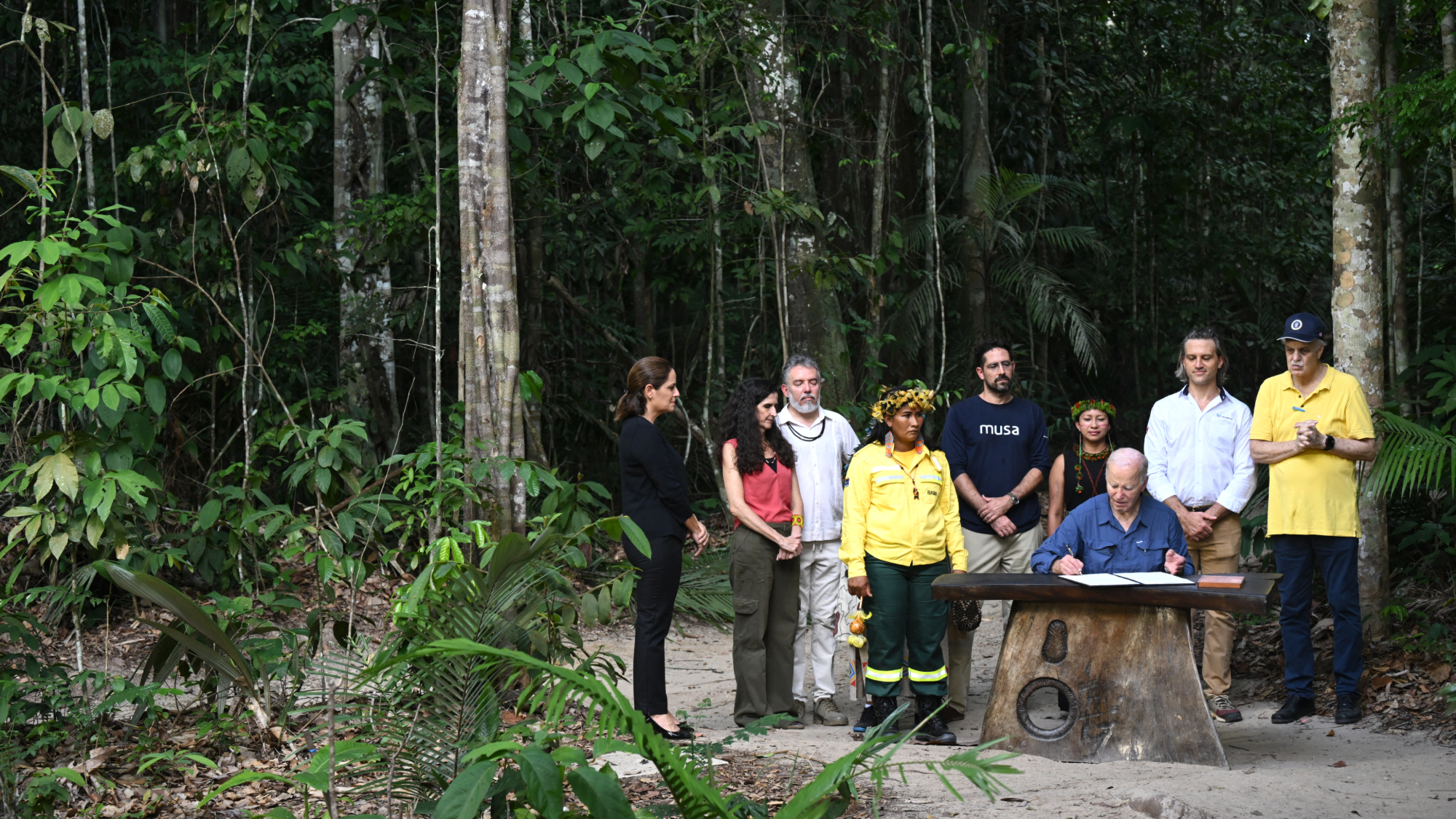Biden visits Amazon, says climate legacy irreversible
Nobody can reverse America's 'clean energy revolution,' said the president, despite the incoming Trump administration's promises to dismantle climate policies


A free daily email with the biggest news stories of the day – and the best features from TheWeek.com
You are now subscribed
Your newsletter sign-up was successful
What happened
President Joe Biden made a stopover in the Brazilian Amazon Sunday, becoming the first sitting U.S. president to visit the world's largest tropical rainforest. Biden took a helicopter tour of the jungle around Manaus and visited a nearby nature reserve situated where the Negro and Amazon rivers meet, signing a declaration designating Nov. 17 International Conservation Day.
Who said what
"The fight against climate change has been a defining cause of my presidency," Biden said, noting hundreds of billions of dollars of U.S. investments in renewable energy and global climate aid. "I will leave my successor and my country a strong foundation to build on, if they choose to do so." It's true that "some may seek to deny or delay the clean energy revolution that's underway in America, but nobody — nobody — can reverse it," he added. Not when so many Americans are "enjoying its benefits" and "countries around the world are harnessing the clean energy revolution to pull ahead themselves."
President-elect Donald Trump is threatening to rip Biden's climate policies "to shreds when he returns to office in January," Politico said. Trump has "pledged to again pull out of the Paris agreement" and "rescind unspent money in energy efficiency legislation," The Associated Press said. And on Saturday he picked Chris Wright, "the head of fracking company Liberty Energy," to be the next energy secretary, The Washington Post said. Wright "contends that the climate crisis is a myth" and "runs a foundation that promotes expanded fossil fuel production."
The Week
Escape your echo chamber. Get the facts behind the news, plus analysis from multiple perspectives.

Sign up for The Week's Free Newsletters
From our morning news briefing to a weekly Good News Newsletter, get the best of The Week delivered directly to your inbox.
From our morning news briefing to a weekly Good News Newsletter, get the best of The Week delivered directly to your inbox.
What next?
Biden travels next to Rio de Janeiro for a G20 summit "where the future of global climate policy is likely to be a major point of discussion," Politico said. At a concurrent United Nations climate summit in Azerbaijan, "global leaders were already discussing a path forward without the U.S. playing a key leadership role."
A free daily email with the biggest news stories of the day – and the best features from TheWeek.com
Peter has worked as a news and culture writer and editor at The Week since the site's launch in 2008. He covers politics, world affairs, religion and cultural currents. His journalism career began as a copy editor at a financial newswire and has included editorial positions at The New York Times Magazine, Facts on File, and Oregon State University.
-
 What to know before filing your own taxes for the first time
What to know before filing your own taxes for the first timethe explainer Tackle this financial milestone with confidence
-
 The biggest box office flops of the 21st century
The biggest box office flops of the 21st centuryin depth Unnecessary remakes and turgid, expensive CGI-fests highlight this list of these most notorious box-office losers
-
 The 10 most infamous abductions in modern history
The 10 most infamous abductions in modern historyin depth The taking of Savannah Guthrie’s mother, Nancy, is the latest in a long string of high-profile kidnappings
-
 The environmental cost of GLP-1s
The environmental cost of GLP-1sThe explainer Producing the drugs is a dirty process
-
 The plan to wall off the ‘Doomsday’ glacier
The plan to wall off the ‘Doomsday’ glacierUnder the Radar Massive barrier could ‘slow the rate of ice loss’ from Thwaites Glacier, whose total collapse would have devastating consequences
-
 Can the UK take any more rain?
Can the UK take any more rain?Today’s Big Question An Atlantic jet stream is ‘stuck’ over British skies, leading to ‘biblical’ downpours and more than 40 consecutive days of rain in some areas
-
 As temperatures rise, US incomes fall
As temperatures rise, US incomes fallUnder the radar Elevated temperatures are capable of affecting the entire economy
-
 The world is entering an ‘era of water bankruptcy’
The world is entering an ‘era of water bankruptcy’The explainer Water might soon be more valuable than gold
-
 Climate change could lead to a reptile ‘sexpocalypse’
Climate change could lead to a reptile ‘sexpocalypse’Under the radar The gender gap has hit the animal kingdom
-
 Why scientists want to create self-fertilizing crops
Why scientists want to create self-fertilizing cropsUnder the radar Nutrients without the negatives
-
 The former largest iceberg is turning blue. It’s a bad sign.
The former largest iceberg is turning blue. It’s a bad sign.Under the radar It is quickly melting away
